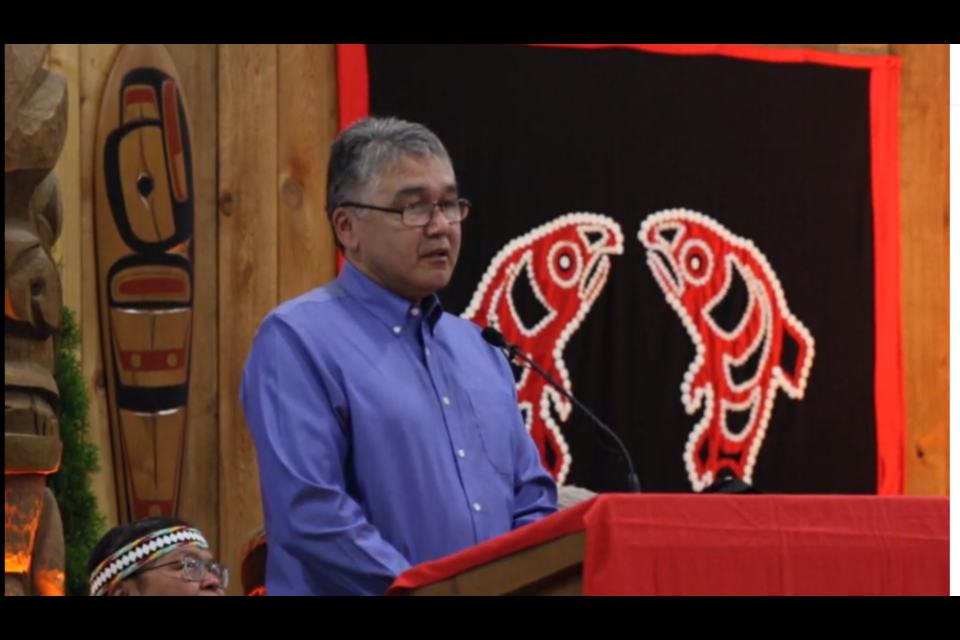Lil'wat Nation students will likely notice a few changes when they return to Xet̓ólacw Community School in September.
The First Nation is one of four in B.C. that finally have total autonomy over how education is delivered in their communities ahead of the new school year, after finalizing a series self-government agreements with the federal government that were more than a decade-and-a-half in the making.
Representatives from Lil'wat Nation, alongside Cowichan Tribes, ʔaq'am, and Seabird Island Band gathered at Seabird Island on July 11 to celebrate the conclusion of the landmark agreements recognizing the Nations' law-making authority over its Kindergarten to Grade 12 education systems, the federal government and First Nations Education Steering Committee (FNESC) announced in a release.
"Where the struggle came in, I guess, [was] in recognizing what needs to be taught. We didn't have a say in what was best for our students," said Lil'wat Nation Chief Dean Nelson, recalling the time when 13 B.C. First Nations started negotiating with the federal government regarding educational jurisdiction 16 years ago.
Those talks kicked off in 2006, when the FNESC, B.C. and federal governments signed an Education Jurisdiction Framework Agreement. Though education typically falls under the jurisdiction of the provinces, First Nations' education remains under the Government of Canada's control. That initial agreement laid out the path for B.C. First Nations to assume jurisdiction by formally recognizing their right to establish and control their own education systems.
The province has also played a role: it made legislative changes in October 2021 to allow B.C. First Nations to certify and regulate teachers who work in schools, and offered operational support to Indigenous communities.
The four participating Nations voted to ratify those agreements earlier this year, while the remaining nine Nations who took part in those early negotiations still need to finalize their own deals.
Though the Lil'wat Nation has been operating its own band-run school since the mid-1970s, the new agreement means the Nation can now make independent decisions about what students learn and who teaches it to them, explained Nelson, a former schoolteacher himself.
"I think the biggest thing is the certification of teachers, of educators," he said. "They don't all fit in the same certification area, because of culture and spirituality and other things that our members have strengthened but that are not recognized in the provincial system."
Particularly when it comes to implementing and expanding culturally based curriculum, from language to history, these staff members' "teachings are just as, if not more important than what's been provided in the professional system," and will help create a "more solid foundation," for students, Nelson said.
In addition to teacher certification, school certification and curriculum, the agreement enables each Nation to set its own individual graduation requirements and approve courses while preserving students’ post-secondary opportunities.
"It's been a long time coming, from when we first started our own school without the support of the province, with just basic funding. There's just so many people to thank," said Nelson. "To carry on that way, and finally reach a point where you don't have the fight any longer for some of these things—we still have ... a lot of things to recover, loss of opportunity and that kind of thing, but I think that's probably the main thing, is the control of our own lives. [It's] probably the greatest thing."
The July 11 event also marked the establishment of the First Nations Education Authority (FNEA) board. Tasked with helping the participating Nations provide education in their own communities, develop curriculum and set guidelines for certification, the new board will be comprised of two directors appointed by each of the participating Nations.
The agreements represent a major step along the path towards reconciliation, aligning with the right to establish and control education systems as affirmed by the United Nations Declaration on the Rights of Indigenous Peoples and recognized under Section 35 of Canada's Constitution Act, 1982.
"The signing of these Education Jurisdiction Agreements will transform the way First Nations students learn, helping them to reach their goals and full potential," said federal Minister of Indigenous Services Patty Hajdu in the release. "The ?aq'am, Cowichan Tribes, Lil'wat Nation and Seabird Island and the First Nations Education Steering Committee are leading the way, and they have reached this place of self-determination through their unwavering vision."




